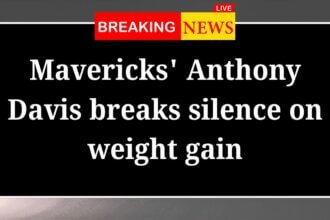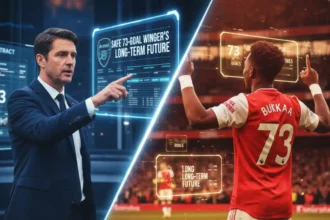NBA’s European League on the Horizon: Potential Launch in 2027 or 2028
The National Basketball Association (NBA) is contemplating the launch of a European league as early as 2027 or 2028, aiming to expand its global reach significantly. This proposed league seeks to capitalize on the growing interest in basketball across Europe while providing a new competitive platform for teams and players on the continent. As the NBA strives to enhance its international appeal, this initiative has the potential to reshape the basketball landscape in Europe and beyond.
- NBA’s European League on the Horizon: Potential Launch in 2027 or 2028
- What We Know About the Proposed League
- The Rise of Basketball in Europe
- Challenges and Considerations
- Global Expansion: A Focus on International Talent
- Fan Engagement and Market Potential
- Future Prospects and Strategic Partnerships
- The Economic Landscape of European Basketball
- Potential Structure of the League
- What This Means for Basketball’s Future
- FAQ
What We Know About the Proposed League
Recent reports from ESPN indicate that NBA Commissioner Adam Silver has hinted at discussions regarding the logistics and structure of this new venture. While details remain preliminary, the prospect of a European league has sparked enthusiasm among fans and players alike. The league could feature teams from multiple European countries, thereby broadening the NBA’s brand reach.
The NBA’s interest in establishing a European league is not entirely unprecedented; the league has been actively engaging with international markets for years. It has hosted preseason games in various European countries and incorporated a number of European players into its rosters. A dedicated league could provide a more structured environment for talent development and fan engagement, as well as create new revenue streams through broadcasting and sponsorship deals.
The Rise of Basketball in Europe
Basketball has experienced a remarkable surge in popularity across Europe, with countries such as Spain, France, and Greece producing top-tier talent and competitive leagues. The EuroLeague, Europe’s premier basketball competition, has successfully showcased the continent’s best teams and players, drawing significant viewership and fan engagement. According to EuroLeague data, the league boasts an audience of over 500 million fans worldwide, underscoring the demand for high-quality basketball.
This growing interest aligns with the NBA’s vision of becoming a truly global league. By establishing a European league, the NBA could leverage this enthusiasm, providing fans with more accessible live games, local stars, and competitive play that mirrors the excitement of the NBA.
Challenges and Considerations
While the idea of an NBA European league is promising, several challenges must be addressed. Key considerations include determining the format of the league, potential partnerships with existing European leagues, and assessing the economic viability of the venture. The NBA would need to navigate complex relationships with established leagues like the EuroLeague and national federations to ensure a seamless integration into the European basketball ecosystem.
Logistics also pose significant challenges. Travel, scheduling, and player contracts would require meticulous planning. NBA teams currently face challenges with travel and time zones during their regular season, and these issues would only be amplified with a transcontinental league. Silver has acknowledged these challenges, stating, “We want to be thoughtful about how we approach this and ensure that it benefits everyone involved, including players and fans.”
Global Expansion: A Focus on International Talent
The NBA has made substantial strides in international recruitment, with players like Luka Dončić, Giannis Antetokounmpo, and Nikola Jokić showcasing the success of European talent within the league. The proposed European league could serve as a significant platform for developing emerging talent while providing ample opportunities for young players who aspire to reach the NBA.
This initiative could enhance the league’s competitive balance by increasing the pool of skilled players available to NBA teams. By identifying and nurturing players in their home countries, the NBA could create a feeder system that not only benefits the league but also strengthens basketball at the grassroots level in Europe.
Fan Engagement and Market Potential
The NBA’s commitment to expanding its brand internationally is highlighted in its marketing strategies and fan engagement efforts. The potential establishment of a European league aligns with the league’s goal of capturing a larger audience and enhancing its global appeal.
A recent NBA survey revealed that over 60% of European basketball fans express a strong interest in watching NBA games, indicating a robust market potential. Establishing a league with local teams could further deepen these connections, allowing fans to support their homegrown talent while fostering a sense of community around the sport.
Future Prospects and Strategic Partnerships
As discussions about the European league unfold, the NBA is likely to seek strategic partnerships with existing basketball organizations, sponsors, and broadcasters. Collaborations with local leagues could facilitate the league’s launch while helping integrate the NBA’s vision with established basketball cultures across Europe.
Leveraging technology and digital platforms will also be crucial in engaging fans. The NBA has been at the forefront of utilizing social media and streaming services to reach global audiences, and a European league would likely adopt similar strategies to ensure widespread viewership.
The Economic Landscape of European Basketball
The potential economic impact of a European league cannot be overstated. An NBA-backed league could attract significant investments, sponsorships, and media rights deals. The success of existing leagues, such as the EuroLeague, which generated around €63 million in revenue in the 2021-2022 season, showcases the financial viability of professional basketball in Europe.
Moreover, the NBA’s global brand could drive merchandising opportunities, ticket sales, and local sponsorships. A European league could create a new economic ecosystem around basketball, benefiting not only the NBA but also local clubs and communities.
Potential Structure of the League
While specifics are still under discussion, the league could adopt a format similar to that of the NBA, with regular-season games leading into playoffs. Team compositions might vary, but it is likely that established franchises could partner with local clubs to foster competitiveness and fan engagement. This structure would not only promote local talent but also provide fans with a familiar sense of rivalry and excitement.
What This Means for Basketball’s Future
The potential launch of an NBA European league represents a significant step towards solidifying basketball’s status as a global sport. By creating a dedicated platform for European players and fans, the NBA could enhance its competitive landscape and firmly establish itself within the European sports market.
As discussions continue, fans and stakeholders will be eager to see how this vision unfolds. The NBA has a history of embracing change, and the establishment of a European league could be the next evolution in its storied legacy.
FAQ
Q: When is the NBA European league expected to launch?
A: The NBA is considering a launch as early as 2027 or 2028, although specific details remain to be finalized.
Q: What challenges does the NBA face in establishing a European league?
A: Key challenges include navigating relationships with existing European leagues, logistical considerations for travel and scheduling, and ensuring the league’s economic viability.
Q: How would a European league benefit player development?
A: A European league could serve as a platform for developing emerging talent, allowing young players to showcase their skills and potentially transition to the NBA.
Q: What impact could the European league have on fan engagement?
A: The league could deepen connections with fans by providing local teams and talent, enhancing the overall basketball experience for supporters across Europe.








